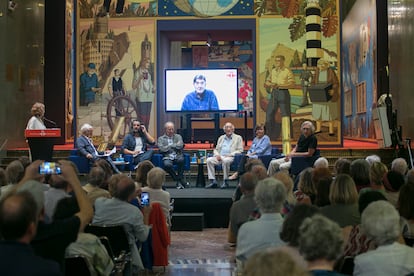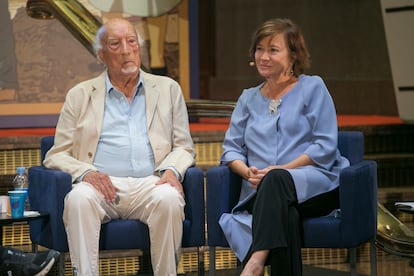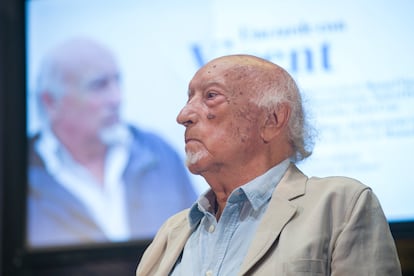“For people of my age, Manuel Vicent is a democratic reference,” he said from a recording, host in the distance, Luis García Montero, director of the Cervantes Institute. The armchairs, crowded. This Thursday the honoree chatted with some friends: Juan Cruz, Nativel Preciado, Joan Manuel Serrat, David Trueba and Manuel Jabois. One afternoon with Vicentthe act was titled. And it is what it was.
Manuel Vicent (Villavieja, Castellón, 89 years old) is a poet of light and sea, like his compatriot, also Valencian, Sorolla. He was born in the war, but defends peace. Among his novels, some of them in that fundamental memorial tone in his fiction and in his columnism are counted Aguirre the magnificent, Against paradise, Green -eyed lion, The Villa Valeria Garden, Malvarrosa tram o They are seaamong others; The last two adapted to the cinema by José Luis García Sánchez and Bigas Luna, respectively. That is why Vicent’s texts read actors Leonor Watling and José Sacristán, who participated in the aforementioned films.
“Here we have all been Vicent students,” Juan Cruz opened. “He is a person who is always thinking, even when he speaks, and also when he writes. He never stops thinking, it is a persecution of thought.” Then he invited the participants to count their first meeting with Vicent. Jabois started, remembering when he met him in Pontevedra: “I thought it was very elegant, I think you can guess the syntax and the lexicon of the authors as they dress,” he joked. He received his lesson: “Do not try to write like the people you admire, look for your own way.”
Nativel Preciado, on the other hand, confessed that he makes very good meatballs. “And Vicent tribured me to include them in his recipe book (Eat and drink my way): It led me to immortality, but they are the best meatballs in the world. ”He not only talked about meatballs, but also how, when precious militated in a small marginal left party, Vicent told him some things about anti -Franco and Vietnamese and then impersonate secret police and threaten her with arrest. After the scare he said: “It is for you to be careful what you tell.” It was an unforgettable lesson. So much that in precious gatherings he still is very careful with what he says.
In Vicent’s credit, in addition to these anecdotes, prizes such as the novel alphaguara (the only author who has won him twice, as Pilar Reyes, editorial director of the seal), the Nadal, or, or, within the journalistic field, the Francisco Cerecedo or the González-Ruano, are counted. His journalistic career has developed in the country, almost since the beginning of the newspaper.

Trueba read Vicent since childhood, when they gave him the newspaper to practice reading, and understood, even, even at such a young age, he detected the quality of the text. When he entered the Faculty of Journalism he carried two columns of Vicent cut, one envelope Lorca and another on the Guernica. “Two articles very much,” David Trueba recalled. Vicent said there that the authentic Guernica It was not the canvas that had just returned to Spain but the reproductions that were in the houses of all Spaniards.
Serrat remembered his radio collaborations and some shared songs, such as The evil of the tarongine. What is Vicent’s magnet? “It’s hard to say. For example, it’s a good conversationalist, it’s very funny, I agree ideologically, but that also happens to me with other people … so it is difficult. But I don’t dislike anything,” Serrat explained. “Sometimes she tells you a story that you don’t remember that you have told it: it’s fantastic.”
And what said Vicent? It was offering counter -anecdotes, very laughed by the public, to the varied and diverse stories narrated. And other things. For example, his encounter with Camilo José Cela (in Batín), the peculiarities of TV when there was only one channel, the way in which the columns occur at the last minute, and a long etcetera, because Vicent in an endless source of stories that reflect with his own look the recent history of Spain.

How do you feel like a writer? Cruz asked. “This is a job like any other, it is not a sacred thing, of the muse, this is professionalized in the mid -19th century,” said the aforementioned. “I want to write well, as I have learned, in Spanish, because I spoke Valencian in the street. Those of us who have learned the Castilian have a lot of respect. What I want is to work, to do columns. Sometimes they go well, other times they go wrong.” In his Sunday texts he tries to condense everything that has been floating in the air during the week … “and in the end, turn the mirror, and show the reader another point of view. But without spoiling him on Sunday.”
“I think that the newspaper’s function is to get dirty, make you give up your certainties, it is depressing; but suddenly, on Sunday, on the last page, there is that kind of shower that takes away your accumulated garbage: Manuel Vicent’s column,” Trueba finished off.

